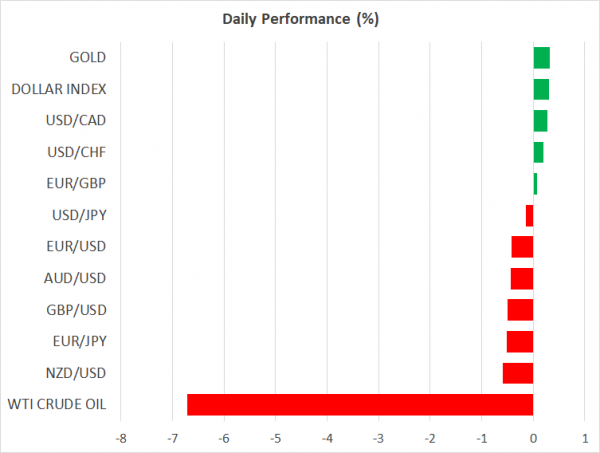- US stocks drop on Amazon earnings, fall further as US-China tensions flare up
- Finally discounting the long-term impact on consumption, psychology, and (de)globalization?
- Yen and dollar shine as risk aversion returns, aussie and kiwi suffer
US-China tensions reintroduce stocks to gravity
The stimulus-fueled bear rally in global stocks seems to be running on fumes, with optimism evaporating after some distressing remarks by Amazon cast doubt on the sustainability of this heavily concentrated market, and the US-China trade war came back to haunt investors.
The biggest 5 companies on the S&P 500 (Microsoft, Apple, Amazon, Google, and Facebook) have gained a bigger and bigger share of the overall index in recent years, and today, they account for roughly one-fifth of the entire S&P in terms of market cap. This implies that any weakness in these 5 stocks could drag the whole market down, so it was only natural for the S&P 500 (-2.8%) to drop on Friday after Amazon (-7.6%) warned it will post zero profits in Q2, shattering the narrative that some giants can swim against the virus tide.
The mood didn’t get any better over the weekend. The Trump administration dialed up the heat against China, with Secretary of State Pompeo saying that “a significant amount of evidence” suggests the virus originated from a lab in Wuhan. Tensions between Washington and Beijing have flared up again lately, as President Trump seems to be harnessing some anti-China sentiment ahead of the November election, which could hinge on who is blamed for the pandemic and its response.
As such, the dreaded trade war seems primed for a comeback, and true enough, recent media reports suggest the White House is considering blocking US government pensions from investing in some Chinese equities and ‘turbocharging’ a plan for repatriating supply chains.
Rally over?
In the big picture, the V-shaped recovery that is now implied by stock valuations seems unrealistic and investors may be underplaying the depth and length of this crisis. Think of how many smaller businesses will shut down permanently or will operate at reduced capacity for months, the long-term impact on spending from exploding unemployment, the lasting behavioral shock to some consumers, and what crumbling US-China relations mean for (de)globalization.
If the initial trade war was the spark for a slowdown in globalization, then this virus and the resultant US-China blame game may be what puts globalization into reverse.
At the end of the day, it might be the depressed commodity markets that are sending the clearest signal about the real state of the global economy, as they aren’t subject to heavy interference by central banks and thus still reflect demand-supply fundamentals. All told, a lot of optimism has been baked back into stocks over the last month, so there’s a lot of room for disappointment if anything goes wrong from here.
Risk aversion returns to FX
In the currency market, all this translated into a classic case of risk aversion. The Japanese yen and the dollar came roaring back as investors went on the defensive, while commodity-linked currencies such as the aussie and kiwi gave up some recent gains. The Canadian dollar was hit especially hard, even though oil prices finally stabilized somewhat, after incoming BoC Governor Tiff Macklem highlighted the option of slashing rates into negative territory if need be.
Looking ahead, if caution continues to reign, that would imply a slow grind higher for both the dollar and the yen, mainly at the expense of commodity-sensitive peers and the euro. The key risk to this scenario would be any positive headline about a virus treatment.
The next major event will be the Reserve Bank of Australia’s policy decision at 04:30 GMT on Tuesday.


